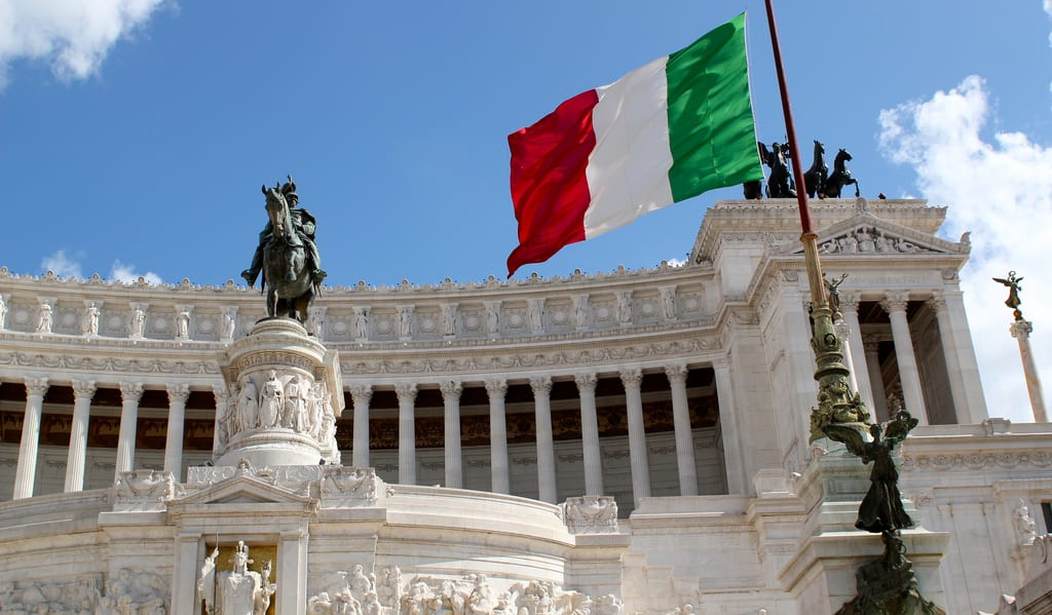Italy has long been the political laboratory of the West, creating fascism and eurocommunism, and playing a major role in the creation of the European Union. Its inconclusive national elections on March 4th provide us with a hazy view of the near future: redefinition of traditional politics, and perhaps even of the world at large.
The most significant event on election day in Italy came when a young woman, topless for the occasion, confronted 82-year old Silvio Berlusconi at his voting place and pronounced him an irrelevancy. I wonder whom she voted for, although we can certainly be confident it wasn’t the Milanese tycoon’s Forza Italia.
In the event, it was a painful election for former prime ministers and longstanding major parties. The two biggest losers were Berlusconi, whose party finished fourth, and the center-left’s Matteo Renzi, who just a few years ago seemed to have become an irresistible force when he took over the Partito Democratico and then the prime minister’s office in Rome. Last Sunday’s election produced the lowest vote for the center-left in post-war Italian political history, and Renzi has promised to resign once a new government is formed.
Whether or not he actually quits—if he’s serious why wait?—we can safely say that the center-left, and with it what little remains of the once-awesome Communist Party, is a spent force. Indeed, as in most of Europe these days, social democracy has lost much of its appeal, as the Mama state has failed to nurture its children. Many of Italy’s best and brightest are headed out, having learned English and the skills in demand in Silicon Valley.
The biggest vote-getter is the 5-Star Movement, a maverick party that, although it predates 2016 by several years, is much like Trump’s gang. Its central theme is “down with the establishment.” Most Italians hardly need convincing (youth unemployment just “improved” to just above thirty percent!), and some thirty percent of them voted 5-Star. There’s a regional factor at work here, as the Movement garnered a full fifty percent of Southern votes, in an area from Rome to Sicily and Sardinia. Many commentators have concluded that the country is now split in two, although this division goes all the way back to the (failed) unification of the nineteenth century. Those of us who frequent the South (I spent years in Rome and Naples, and am a founding director of the Catania Jewish community, recreated some six centuries after it was abolished by the Inquisition) know how deep the division runs, and it’s not at all a recent development.
Some analysts, including Spain’s El Pais, credit a vigorous Russian media campaign, aimed at sabotaging Italian political unity. This, too is an old story; the Soviets were active disinformation players, especially in the post-war years, and I have little doubt that the Russian intelligence service continues to do the same. I rather doubt that this explains voters’ behavior. Even parties and leaders that openly praise Putin (as 5-Star does, and as Berlusconi did when he was prime minister) have good economic reasons, starting with the natural gas pipeline to Europe from Russia, for their position. The two main appeals of 5-Star are extreme skepticism of the European enterprise, and guaranteed minimum income for all. They triumphed despite a failed stint governing Rome.
The other winner is “The League,” for years aka Northern League. Its old incarnation accepted the division of the country, maintained that the South was hopelessly corrupt, and insisted that the North was virtuous. Then a series of scandals obliterated the leaders of Northern League, and today, remarkably, it has become a national party with a charismatic leader (Matteo Salvini). The League, generally classified as a center-right party, did better than Berlusconi’s Forza Italia.
The best description of the Italy that voted on March 4th is, as journalist Federico Cartelli has said, “post-ideological.” The country was once contested by the Communists and the Christian Democrats, the left and the right. These are now largely meaningless categories. Italians will have to sort out a new politics, just as the rest of us. And why not? Ever since the death of the Soviet Empire, and the end of the bipolar world it contested, national leaders from Pyongyang to Washington have scrambled to find a new world order. So far, without success. Just as the Italian national elections, at least for the moment, have left us with more questions than answers.
The political leaders are now wheeling and dealing, trying to find some sort of coalition that can hold together long enough to avoid a new round of voting in a few months. The odds are they will succeed, and that the ministries will be divvied up between The League and 5-Star, with Forza Italia in there as an opportunistic balance. Other coalitions are possible, but they all reflect a desire for money and political power, rather than a durable world-view. The same holds for Europe as a whole, as for that manner for the United States and its neighbors.
In time, Italy seems destined for some sort of federalist system that accepts the unpleasant failure of national unification, just as the EU is increasingly the domain of a handful of stronger nation states, above all Germany, with countries like Britain and Italy opting out of more and more elements of the central enterprise. Like Italy, Europe itself never accomplished durable political union, and thus the Italian future opens a window into the future of the whole continent.
It’s the political laboratory of the West, after all.









Join the conversation as a VIP Member